There are several ways a man can check his health, including:
- Regular check-ups with your trusted doctor: Men should have regular check-ups with their doctor to monitor their health and catch any potential health problems early.
- Health screenings: Health screenings, such as blood pressure checks, cholesterol and sugar tests, and prostate exams, can help men monitor their health and detect any potential health problems.
- Self-exams: Men can perform self-exams, such as testicular self-exams, to check for any abnormalities and catch potential health problems early.
- Lifestyle changes: Making healthy lifestyle changes, such as eating a balanced diet, getting regular exercise, and avoiding smoking and excessive alcohol consumption, can improve a man’s overall health.
- Mental health: Mental health is also an important aspect of overall health, and men should pay attention to their emotional well-being and seek help if they are feeling depressed, anxious, or stressed.
It’s important for men to take an active role in their health and to talk to their trusted doctor about any concerns they have. Different factors, such as age and family history, can influence what types of health checks and screening tests a man may need, so it’s best to discuss your individual health needs with your trusted doctor. Early detection and treatment of health problems can greatly improve a man’s chances for a long and healthy life.
At what age do men start to slow down?
The age at which a man starts to slow down can vary greatly based on individual factors such as genetics, lifestyle habits, and overall health. However, some changes in physical function are commonly experienced as men age, such as a decrease in muscle mass, strength, and flexibility.
Around the age of 30, the body starts to naturally produce less testosterone, the hormone that helps build muscle and maintain bone density. This can result in a decline in physical performance, but with regular exercise and a healthy lifestyle, many men can slow down the effects of aging.
As men reach their 40s and 50s, they may start to experience a decline in cardiovascular fitness, as well as a decrease in the production of human growth hormone, which can lead to a decrease in muscle mass and a decline in overall physical function.
It is important to note that these changes can vary greatly from person to person, and that staying active and maintaining a healthy lifestyle can help men stay physically fit and active as they age. Ultimately, every person’s experience with aging is unique, and the best way to determine when and how one is starting to slow down is to pay close attention to one’s own body and discuss any concerns with your trusted doctor.
What age are males most hormonal?
In adulthood, testosterone levels can fluctuate for a variety of reasons, such as stress, illness, or changes in physical activity levels. However, testosterone levels tend to decline gradually with age, starting in a man’s 30s or 40s. This decline in testosterone, known as “andropause”, can result in symptoms such as fatigue, low sex drive (low libido), increased body fat and decreased muscle mass.
It’s important to note that while there is no specific age at which males are considered to be the “most hormonal,” every man’s experience with hormones is unique and can be affected by a variety of factors, such as genetics and overall health. Some men may not experience significant changes in hormone levels until later in life. .

At what age do men stop getting as hard?
The age at which men stop getting as hard, or experience difficulties with maintaining an erection, can vary greatly. Erectile dysfunction (ED), which refers to the inability to achieve or maintain an erection, can occur at any age, but is more common as men get older, especially above 60 years old.
ED can be caused by a variety of physical and psychological factors such as stress, anxiety and depression. As men age, the risk of developing ED does increase, and age-related health issues such as cardiovascular disease, high blood pressure, and diabetes can also contribute to ED. Lifestyle factors, such as smoking, excessive alcohol consumption, and a sedentary lifestyle, can also contribute to ED.
It’s important to note that while ED is more common in older men, it is not an inevitable part of aging and can often be treated. If a man is experiencing difficulties with maintaining an erection, it’s best to discuss these concerns with a trusted doctor, who can help to determine the underlying cause and recommend appropriate treatment options.
What happens to a man’s body after 50?
After the age of 50, a man’s body may undergo several changes, some of which are related to the natural aging process and some of which may be influenced by lifestyle and overall health.
Here are some of the common physical changes that can occur in a man’s body after 50:
- Decreased muscle mass: This can lead to decreased strength and mobility.
- Changes in body fat distribution: They may also experience changes in body fat distribution, with an increase in abdominal fat.
- Decreased testosterone production: Testosterone production typically begins to decline in a man’s 30s or 40s, and this decline can continue as a man reaches his 50s and beyond.
- Changes in sexual function: Such as a decline in libido and the ability to get and maintain an erection.
- Decreased bone density: This can increase the risk of osteoporosis and fractures.
- Changes in sleep patterns: Such as difficulty falling asleep or staying asleep.
- Changes in skin: The skin may become thinner and less elastic, leading to wrinkles and age spots.
- Increased risk of chronic health conditions: As men age, they may also be at an increased risk of developing chronic health conditions, such as heart disease, diabetes, and certain cancers.
It’s important to note that while these changes are a normal part of aging, they can be influenced by lifestyle factors, such as diet, exercise, and stress levels. Maintaining a healthy lifestyle through regular exercise, a healthy diet, and avoiding harmful habits such as smoking can help to slow down the effects of aging and maintain physical and emotional well-being.

How do you tell if you have any health problems? How can a man tell if he has any health problems?
A man can tell if he has health problems by paying attention to physical symptoms and changes in his body, as well as by regularly visiting his trusted doctor for check-ups and screenings. Some common signs of health problems in men include:
- Pain or discomfort: Persistent pain or discomfort, especially in the chest, back, or abdomen, can be a sign of an underlying health problem.
- Changes in sexual function: Changes in sexual function, such as a reduced libido or difficulty achieving or maintaining an erection, can be a sign of a health problem.
- Fatigue: Feeling tired or lacking energy, even after a good night’s sleep, can be a sign of an underlying health issue.
- Skin changes: Changes in skin appearance, such as unusual moles or skin discoloration, can be a sign of a skin condition or skin cancer.
- Mood changes: Changes in mood, such as depression or anxiety, can be a sign of a mental health issue.
- Watch for symptoms specific to men: Some health problems, such as prostate problems and testicular cancer, are specific to men. If a man experiences any symptoms such as difficulty urinating, pain in the lower back or pelvis, or swelling in the testicles, he should discuss these concerns with his trusted doctor.
If a man is experiencing any of these symptoms or has any concerns about his health, it’s best to discuss these concerns with a trusted doctor, as early detection and treatment of health problems can often lead to better outcomes.
What age do men start getting health problems?
The age at which men start to experience health problems can vary greatly depending on several factors, including genetics, lifestyle, and overall health. However, it’s not uncommon for men to start experiencing some age-related health problems in their 40s and 50s.
That being said, health problems like diabetes, high cholesterol levels, and high blood pressure, can develop at any age even for men in their 20s and 30s, and it’s important to take steps to maintain good health throughout life.
Some health problems, such as heart disease and certain types of cancer like colon cancer, are more common in men than in women. It’s important for men to be aware of their risk for these and other health problems, and to take steps to reduce their risk. This may include making lifestyle changes, such as adopting a healthy diet and exercise routine, and getting regular check-ups and screenings with a trusted doctor.

How can I test myself for health?
While some self-tests can give you an idea of your overall health, it’s important to note that they cannot replace a thorough examination by your trusted doctor. However, there are some things you can do to monitor your own health:
- Blood pressure test: You can purchase a home blood pressure monitor and check your blood pressure regularly. High blood pressure is a major risk factor for heart disease and stroke.
- Blood sugar test: If you have diabetes or are at risk for the condition, you may be able to test your blood sugar levels at home using a blood glucose meter.
- Body mass index (BMI) test: You can calculate your BMI by dividing your weight in kilograms by the square of your height in meters. A BMI of 25 or higher is considered overweight, and a BMI of 30 or higher is considered obese.
- Skin self-exam: You can check your skin for any changes, such as new moles or growths, or changes to existing moles. Skin cancer is a fairly common type of cancer, and early detection is important for successful treatment.
- Testicular self-exam: You can check both your testes for lumps or abnormal growths. If you detect any lumps, or abnormal sensations, see your trusted doctor immediately.
It’s important to remember that these self-tests can provide important information about your health, but they are not a substitute for professional medical care. If you have any concerns about your health, it’s important to see your trusted doctor as soon as possible.
What age are men most tested? What do men need to get checked?
The age at which a man is most tested depends on several factors, including his overall health, family medical history, and personal health risk factors. In general, it’s recommended that men receive certain health screenings on a regular basis, starting at age 50 or earlier if they have specific risk factors.
There are certain age milestones that are commonly associated with an increased need for certain medical tests.
For example:
- In their 20s and 30s: During this time, men may be advised to have regular check-ups and blood tests to monitor their overall health and to detect any early signs of health problems.
- In their 40s and 50s: As men enter their mid-life years, they may be advised to have more frequent check-ups and screenings, such as a blood pressure check, cholesterol test, and a colon cancer screening.
- After age 50: Men over the age of 50 are advised to have a number of important health screenings, including a prostate exam, a PSA test (a blood test used to screen for prostate cancer), and a colon cancer screening.
It’s important to discuss your personal screening schedule with your trusted doctor, who can help to determine the right screening schedule based on your individual needs and risk factors.

What are 5 male health concerns?
There are many health concerns that men face, but here are the 5 more common ones:
- Heart disease: Heart disease is a leading cause of death for men and is caused by a build-up of fatty deposits in the arteries. Symptoms of heart disease can include chest pain, shortness of breath, and fatigue.
- Prostate cancer: Prostate cancer is a common form of cancer among men, and it can be difficult to detect in its early stages. Common symptoms in late stage prostate cancer may include difficulty urinating, frequent urges to urinate, and pain or discomfort during ejaculation.
- Testosterone decline: Testosterone levels naturally decline as men age, and low testosterone levels can lead to a range of symptoms, including decreased muscle mass, decreased bone density, and reduced sex drive.
- Erectile dysfunction: Erectile dysfunction (ED) is a common problem among men, and it can be caused by a range of physical and psychological factors. Symptoms of ED include difficulty achieving or maintaining an erection, and reduced sexual desire.
- Mental health: Mental health is an important aspect of overall health, and men are often less likely than women to seek help for mental health issues. Common mental health concerns among men include depression, anxiety, and stress.
By taking steps to maintain their health, men can reduce their risk of developing these and other health problems, and improve their overall well-being. Regular health screenings and check-ups can also help you to detect and treat health problems early, when they are often more easily treated.
Why should men get checked regularly?
It’s recommended for men to get a regular health check-up for several reasons, including:
- Early detection of health problems: Regular health check-ups can help identify potential health issues early on, when they are often more treatable. This can help prevent more serious health problems down the road.
- Prevention and risk reduction: A health check-up can help men understand their risk for certain health problems and learn how to reduce their risk through lifestyle changes or other measures.
- Monitoring of existing medical conditions: If a man has an existing medical condition such as diabetes, high blood pressure, or heart disease, regular check-ups can help monitor the condition and ensure that it is being effectively managed.
- Maintenance of overall health: Regular health check-ups provide an opportunity for men to discuss any concerns they may have about their health and receive advice on how to maintain or improve their well-being.
- Screening for common health problems: Some common health problems, such as prostate cancer and testicular cancer, are more common in men. Regular health check-ups can include screenings for these conditions, helping to detect them early.
It’s important for men of all ages to get regular health check-ups, but the frequency and specific tests required may vary based on factors such as age, family history, and overall health status. Your trusted doctor can advise you on the appropriate schedule for your individual needs.
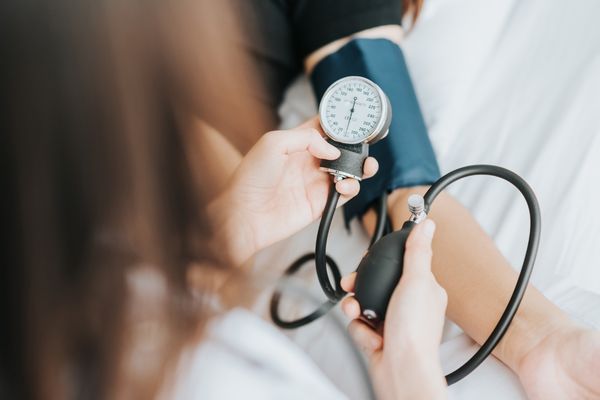
What is a full health check?
A full health check, also known as a comprehensive health screening, is a thorough evaluation of a person’s physical and mental health. The purpose of a full health check is to assess the overall health status of an individual, identify potential health problems, and to create a baseline for future comparison. It usually includes a series of tests, evaluations, and assessments to determine an individual’s physical and physiological well-being.
The scope of a full health check can vary depending on the person’s age, gender, health history, and other factors, but it typically covers the following aspects:
- Physical examination: This includes checking vital signs such as blood pressure, heart rate, and breathing rate, as well as assessing the individual’s overall appearance and build.
- Medical history review: The doctor or healthcare provider will ask about the person’s health history, including any prior illnesses, surgeries, or hospitalizations. Diseases that run in the family are also explored, for example history of cancers, genetic diseases, diabetes, high cholesterol or high blood pressure.
- Laboratory tests: A full health check may include a range of laboratory tests such as blood tests (e.g. FBC, glucose, lipid panel, liver and kidney function tests), urine tests, and stool tests. More of this will be discussed below.
- Cancer screenings: Men over the age of 50 are typically advised to have regular screenings for colon and prostate cancer, as these are the two most common types of cancer in men.
- Imaging tests: Depending on the person’s symptoms and health history, a full health check may also include imaging tests such as X-rays, CT scans, or MRI scans.
- Cardiovascular evaluation: This may include an electrocardiogram (ECG) to check the heart’s electrical activity, and other tests to assess heart function and blood flow.
- Lung cancer screening: Men who have a history of smoking or other risk factors for lung cancer may be recommended to undergo a low-dose CT scan to screen for lung cancer.
- Bone density test: Men with risk factors for osteoporosis, such as low body weight or a family history of the condition, may be recommended to undergo a bone density test.
- Sexual health screenings: Depending on your sexual behavior and personal history, your doctor may recommend testing for sexually transmitted infections (STIs). In an older man, screening for erectile dysfunction may be appropriate.
The goal of a full health check is to identify any potential health problems early, so that they can be treated or managed before they become more serious. The results of a full health check can help your trusted doctor to diagnose any existing health problems, provide preventive health recommendations for you, and establish a mutually agreeable plan to maintain or improve your well-being.

When should men have a health check?
Some common health screenings for men and the relevant ages to start screening include:
- Prostate cancer screening: Beginning at age 50 (or earlier if there is a family history of prostate cancer), men should receive regular prostate cancer screenings, such as a prostate-specific antigen (PSA) test and/or a digital rectal exam.
- Colorectal cancer screening: Beginning at age 40 (or earlier if there is a family history of colorectal cancer), men should receive regular colorectal cancer screenings, such as a colonoscopy or a stool test.
- Blood pressure screening: Beginning at age 18, men should have their blood pressure checked at least once every two years. If a man has high blood pressure or other risk factors, he may need to be screened more frequently.
- Cholesterol screening: Beginning at age 35 (or earlier if there is a family history of high cholesterol), men should have their cholesterol levels checked regularly.
- Diabetes screening: Beginning at age 35, men should have their blood sugar levels checked regularly to screen for diabetes. If a man is overweight, has high blood pressure, or has a family history of diabetes, he may need to be screened earlier.
How often should a man get tested?
The frequency of medical testing recommended for men can vary based on several factors, including age, overall health, personal and family medical history, and other risk factors.
Here are some general guidelines for frequency of medical testing in men:
- Physical check: It is recommended that men have a physical check in clinic at least once a year, or more frequently if they have a chronic condition
- Lab tests: Blood and urine tests can help to monitor overall health, detect health problems early, and evaluate the effectiveness of treatments. The frequency of blood tests can vary based on a man’s individual needs, but as a general suggestion, yearly would be a good place to start.
- Cancer screenings: Men over the age of 50 are typically advised to have regular screenings for colon and prostate cancer, as these are the two most common types of cancer in men. Similarly yearly would be a good frequency to follow.
By getting regular check-ups and health screenings with your trusted doctor,it will be easier to detect and treat any health problems early, when they are often more easily treated.
What blood tests should a man get? What blood tests are run during a physical?
The blood tests a man should get depend on his individual health status, medical history, and risk factors. However, here are some of the common blood tests that men may need to undergo:
- Full Blood Count (FBC) – This test measures the number of red blood cells, white blood cells, and platelets in the blood.
- Lipid Profile – This test measures the levels of cholesterol and triglycerides in the blood.
- Blood glucose test – This test measures the level of sugar in the blood and can help diagnose diabetes or prediabetes. HBA1c measures the 3 month average of the glucose sugar levels in the blood.
- Liver function tests – These tests measure the levels of enzymes and other substances produced by the liver.
- Kidney function tests – These tests measure the levels of creatinine, urea, and other substances produced by the kidneys.
- Prostate-specific antigen (PSA) – This test is used to screen for prostate cancer in men. This test should be discussed with your doctor to determine if it is appropriate for you.
- Sexually Transmitted Diseases (STD) testing – Depending on the risk factors and symptoms, men may need to get tested for STIs such as HIV, gonorrhea, chlamydia, and syphilis.
- Vitamin D level – This test measures the level of vitamin D in the blood, which is important for bone health and other bodily functions.
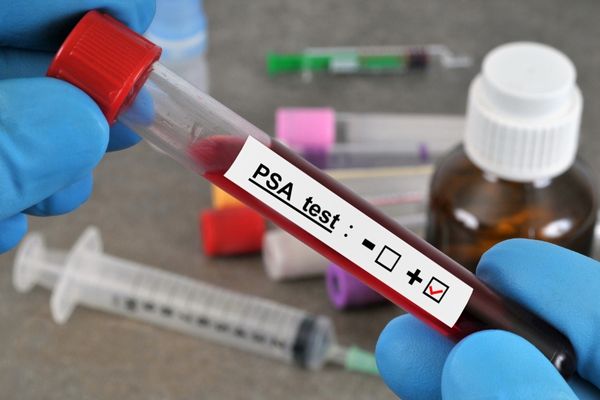
What cancers are detected by blood tests?
Blood tests can be used to detect certain types of cancer by measuring specific biomarkers in the blood. However, it’s important to note that a blood test alone cannot diagnose cancer, and further testing, such as imaging or a biopsy, is usually necessary to confirm a diagnosis.
Here are some of the cancers that can be detected by blood tests:
- Prostate cancer – The prostate-specific antigen (PSA) blood test is used to screen for prostate cancer. This test should be done in conjunction with a digital rectal examination of the prostate, to ascertain the risk of prostate cancer.
- Colorectal cancer – The fecal occult blood test (FOBT) is used to screen for colorectal cancer. These tests detect blood in the stool, which can be a sign of cancer or other conditions. If the FOBT is positive, colonoscopy is usually advised to check for cancer or other conditions.
- Blood cancers – Blood tests such as the Full Blood Count (FBC) and Peripheral Blood Film (PBF) can be used to diagnose blood cancers, such as leukemia, lymphoma, and multiple myeloma, by looking at the number and type of blood cells in the sample.
How do you check a man’s testosterone level?
Testosterone is a male sex hormone that is responsible for male sexual development, muscle and bone strength, and other bodily functions.
To check a man’s testosterone level, healthcare providers may use one or more of the following tests:
- Blood Test – The most common and preferred way to check testosterone levels is a blood test. Your doctor will draw blood from a vein in the arm and send the sample to a laboratory for analysis. This test measures the total testosterone level in the blood. Usually this test is done early in the morning, at around 9am to measure peak testosterone levels.
- Saliva Test – A saliva test may also be used to measure testosterone levels, although it is not as commonly used as the blood test.
- 24-hour urine test – A 24-hour urine test may be used to measure the total amount of testosterone in the body.
It’s important to note that testosterone levels can vary throughout the day and may be affected by various factors such as age, diet, exercise, and medication. Additionally, a single test may not be enough to diagnose low testosterone levels. Hence, it is recommended that you discuss your symptoms with a trusted doctor first before measuring your testosterone levels.
What age should a man get a prostate exam?
Prostate cancer screening starts at age 50 for most men. However, for men who are at higher risk of prostate cancer, such as men with a family history of prostate cancer, screening may be recommended at an earlier age, such as age 45.
What happens when a man gets a prostate exam?
A prostate exam, which involves a digital rectal exam (DRE) and a prostate-specific antigen (PSA) blood test, is typically performed by a doctor as part of a routine check-up or prostate cancer screening. During a DRE, the doctor inserts a gloved, lubricated finger into the rectum to feel for any abnormalities in the prostate.
The PSA blood test measures the level of prostate-specific antigen in the blood, which may be elevated in men with prostate cancer. Do note that the PSA test is not specific to prostate cancer, and elevated levels can also be caused by other conditions, such as an enlarged prostate or an infection, or even after ejaculation of semen. Additionally, not all prostate cancers cause an elevation in PSA levels.
Therefore, the decision to undergo prostate cancer screening should be based on a discussion with your trusted doctor, taking into account an individual’s personal and family medical history and other risk factors.
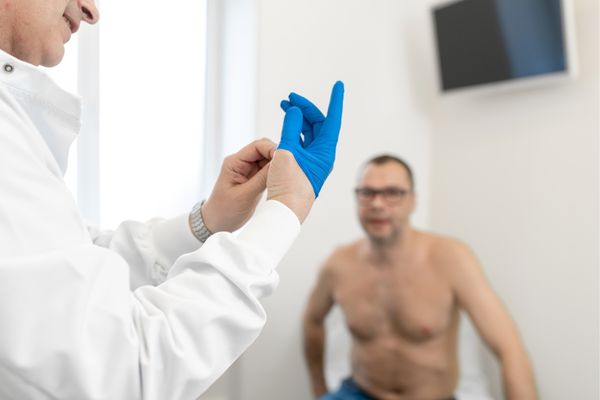
How many fingers are used in a prostate exam?
During a prostate exam, a doctor will typically use one finger to perform a digital rectal exam (DRE). The doctor will insert a gloved and lubricated finger into the rectum to feel for any abnormalities in the prostate gland.
The exam is relatively quick and painless, and the doctor will use gentle pressure to feel the size, shape, texture and other abnormalities like nodules of the prostate gland. The exam is typically performed as part of a routine check-up or as part of a prostate cancer screening.
Can I check my own prostate?
It is not recommended for individuals to check their own prostate for abnormalities or to perform a self-prostate exam. The prostate is an internal organ located in the pelvis, and it is difficult to feel for abnormalities without proper training and equipment.
While it is important for men to be aware of their own health and to report any concerning symptoms to their trusted doctor, attempting to check the prostate on your own can be both uncomfortable and potentially harmful. If you have concerns about your prostate or other aspects of your health, it’s important to discuss them with your trusted doctor.
Why do men not get prostate exams?
There are several reasons why some men may not get prostate exams, including:
- Lack of Symptoms – Prostate cancer may not cause any noticeable symptoms in its early stages, and some men may not realize they have a problem until the cancer has advanced. As a result, they may not feel the need to undergo a prostate exam or prostate cancer screening.
- Fear and Embarrassment – Some men may feel uncomfortable or embarrassed about the prospect of a digital rectal exam (DRE), which is part of a prostate exam. This can be a barrier to seeking medical care, even though the procedure is relatively quick and painless.
- Lack of Knowledge – Some men may not be aware of the importance of prostate cancer screening or may not know when they should begin undergoing screening. As a result, they may not schedule regular prostate exams.
- Belief That Prostate Cancer is Not a Serious Issue – Some men may not perceive prostate cancer as a significant health issue, which can lead to a lack of interest in undergoing screening.
It’s important for men to discuss their individual risk factors and any concerns they have about prostate cancer screening with a trusted doctor. By working together, men and their trusted doctor can make informed decisions about when and how often to undergo prostate exams or prostate cancer screening.

What is the main problem of the prostate?
The main problem associated with the prostate gland is typically related to the development of benign prostatic hyperplasia (BPH) or prostate cancer.
Benign prostatic hyperplasia, also known as an enlarged prostate, is a common condition that can occur as men age. It is caused by an overgrowth of prostate tissue that can lead to difficulty urinating, such as a weak urine stream, frequent urination, and the feeling of not being able to fully empty the bladder.
Prostate cancer is another potential problem associated with the prostate gland. It is a cancer that begins in the prostate gland and can spread to other parts of the body. Prostate cancer can develop slowly and may not cause noticeable symptoms in its early stages, which is why screening for prostate cancer is important, particularly for men who are at higher risk due to age, family history, or other factors.
What is the main cause of prostate problems?
The main cause of prostate problems, such as benign prostatic hyperplasia (BPH) and prostate cancer, is not fully understood. However, several risk factors have been identified, including:
- Age – As men age, their risk of developing prostate problems increases. BPH is common in men over the age of 50, while prostate cancer is more common in men over the age of 65.
- Family history – Men with a family history of prostate problems, particularly prostate cancer, have an increased risk of developing these conditions themselves.
- Ethnicity – Prostate cancer is more common among African American men than among men of other ethnicities.
- Hormones – The male hormone testosterone is thought to play a role in the development of prostate problems, although the exact mechanisms are not well understood.
How often should a man get his prostate checked?
The frequency of prostate exams, also known as prostate cancer screening, is a topic of debate among doctors. Generally it is recommended that men with an average risk of prostate cancer receive a prostate-specific antigen (PSA) blood test and digital rectal exam starting at age 50, or earlier for men at higher risk.
For men with an increased risk of prostate cancer, such as those with a family history of the disease, screening may begin at an earlier age, typically around age 40 to 45. Similarly, men with symptoms of prostate problems, such as difficulty urinating, may need to be screened earlier.
It’s important for men to discuss their individual risk factors for prostate cancer with their doctor to determine the best screening schedule. In general, prostate exams are typically recommended every 1 to 2 years for men who are being actively screened for prostate cancer.
How to prepare for a male check up?
To prepare for a male check-up, you can take the following steps:
- Gather your medical history: Make a list of your current medications, any allergies you have, any chronic health conditions you have, and any surgeries you have had in the past. Bring this information with you to the appointment.
- Wear comfortable clothing: Wear comfortable clothing that is easy to remove, as you may need to change into a medical gown for some parts of the exam.
- Avoid heavy meals: Try to avoid heavy meals before your exam, as this can interfere with some of the tests and procedures that may be performed.
- Hydrate: Drink plenty of water before your exam, as you may need to provide a urine sample.
- Prepare questions: Write down any questions or concerns you have about your health, so that you can discuss them with your doctor during the exam.
- Follow any specific instructions: If the clinic has given you specific instructions, such as fasting before the exam, be sure to follow them as directed.
By taking these steps, you can help ensure that your check-up goes smoothly and that you get the most out of your appointment.
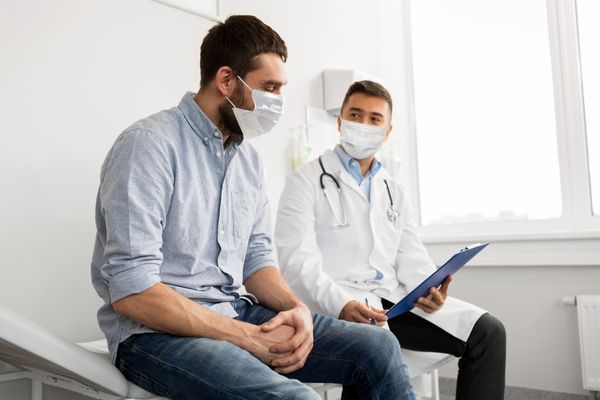
Can I ask my doctor for a full health check?
Yes, you can certainly ask your doctor for a full health check, also known as a comprehensive health screening. A full health check typically includes a review of your medical history, physical examination, and various health screenings, such as blood tests and imaging studies, to assess your overall health and identify any potential health issues.
During the health check, your doctor will typically ask you questions about your health history, lifestyle, and any symptoms you may be experiencing. The doctor should also perform a physical examination, which may include measuring your vital signs (such as blood pressure and heart rate), checking your heart and lungs, examining your abdomen and extremities, and performing a neurological exam.
After the examination, your doctor may recommend additional tests or follow-up appointments, depending on the results of the health check up and your individual health needs.
What should you not do before a physical exam?
To ensure accurate results and a successful physical exam, there are a few things that you should avoid doing before your appointment. These include:
- Heavy meals: Avoid eating a heavy meal or large amounts of food before your exam, as this can interfere with some of the tests and procedures that may be performed.
- Caffeine and alcohol: Avoid consuming caffeine and alcohol before the exam, as they can affect your blood pressure, heart rate, and other vital signs.
- Strenuous exercise: Avoid doing any strenuous exercise or physical activity before the exam, as this can affect some of the test results and lead to inaccurate readings.
- Nicotine: Avoid smoking or using nicotine products before the exam, as nicotine can increase your blood pressure and heart rate.
- Dehydration: Be sure to drink enough water before the exam to stay hydrated, as you may need to provide a urine sample.
It’s important to follow any specific instructions given by the clinic before the health screening to ensure accurate results.
Should I be fasted before medical check up?
It depends on the type of medical check-up or screening test you are having. For some tests, such as a fasting blood glucose test or fasting lipid cholesterol test, it is important to fast for a certain period of time (typically 8-12 hours) before the test to get accurate results. Fasting means that you should not eat or drink anything except water during the fasting period.
For a routine physical check up, fasting is usually not necessary. You can eat and drink normally before seeing your doctor, but it’s a good idea to avoid heavy meals and caffeinated drinks, which can affect your blood pressure and heart rate. However, do check in with the clinic first if you are not sure to be fasted or not.
Can we drink water before health check up?
In general, drinking water is allowed and even encouraged before a health check-up. It is important to stay well hydrated, and drinking water can help ensure accurate test results, especially for tests that require a urine sample.
However, for some specific tests or procedures, your doctor may instruct you to avoid drinking water or other liquids for a certain period of time before the test. For example, if you are having an ultrasound scan or other imaging test, you may need to drink water and then hold your urine for a period of time before the test to help improve the clarity of the images.
If you are unsure whether you should drink water before your health check-up or a specific test, it’s best to check with the clinic or doctor for specific instructions.
Conclusion of a man’s check-up
In Paddington Medical, Dr Lee Joon Loong is the main GP doctor that treats all men’s health issues, such as prostate urinary health issues, erectile dysfunction (ED), testosterone deficiency, and many others. Dr Lee previously worked in multiple urological departments in Singapore and Australia and has gained experience in Men’s Health issues. He is also a member of the Society of Men’s Health Singapore, and has achieved the Certificate in Andrology (SMHS).
Dr Lee has helped many men with erectile dysfunction and other men’s health issues like urinary problems and ejaculation issues. He passionately believes that men should seek help from a trusted doctor in order to improve their health, and regain their self esteem and confidence.
Click here to see more details above our health screening packages. If you are interested in finding out more about what are the relevant tests you need for your well men’s health screening, feel free to book an appointment down below or whatsapp us for an appointment. Take care and stay healthy!
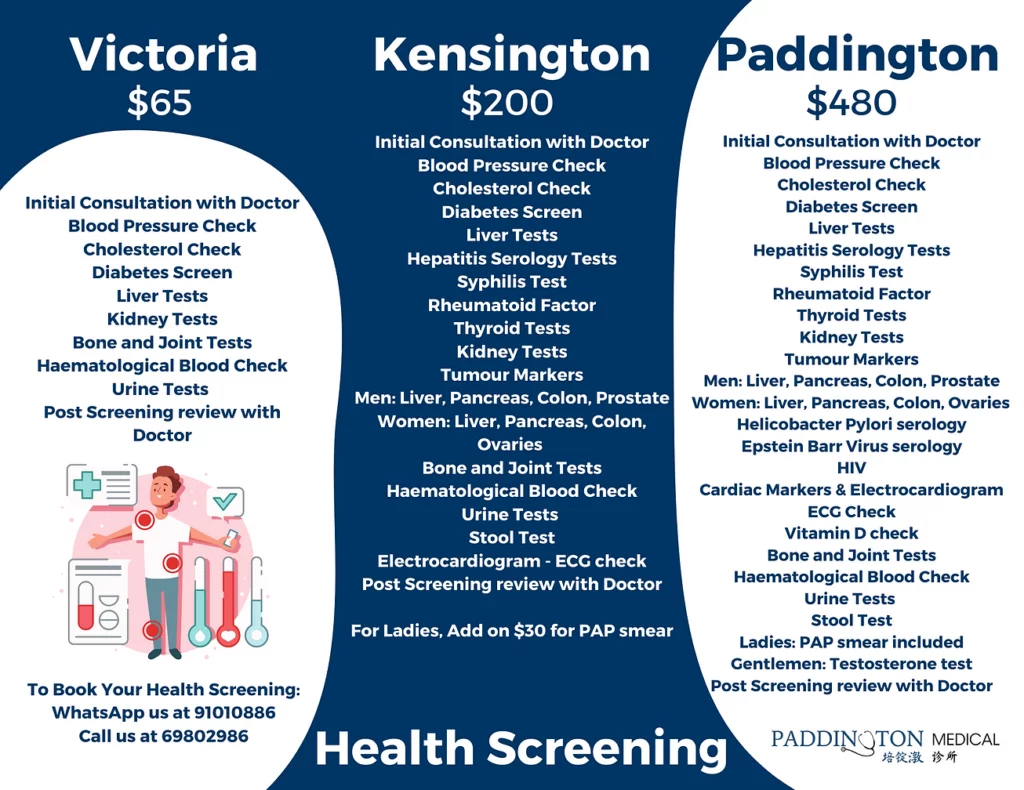
GET IN TOUCH
Schedule a Visit

Dr Lee Joon Loong
Medical Director
MBBS (Australia)
Graduate Diploma in Geriatric Medicine
Designated Workplace Doctor (CAW)
EIMS Primary Care Physician
Certificate Course in Andrology (Men’s Health)
Dr Lee is in Clinic on Monday, Wednesday, Friday, Saturday and Sunday.
Dr Lee’s surgical procedure days are on Tuesday and Thursday





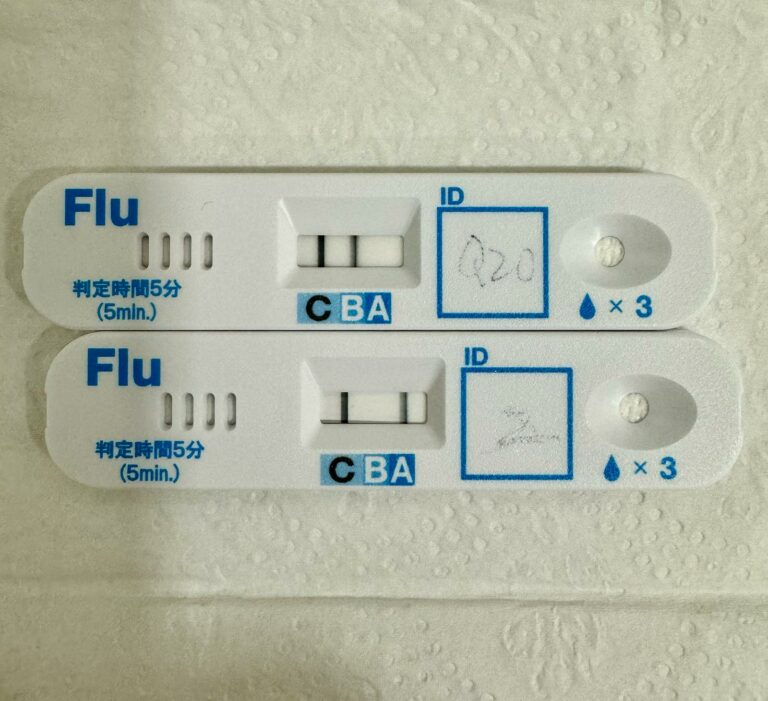
I like this post, enjoyed this one thanks for putting up. “It is well to give when asked but it is better to give unasked, through understanding.” by Kahlil Gibran.